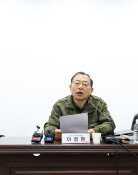Incentive-based Pay in the Public Sector
Incentive-based Pay in the Public Sector
Posted March. 16, 2010 09:10,
The introduction of an innovative incentive-based salary system for all 286 state-run agencies nationwide this year is likely to enhance efficiency in the public sector. In an interview with The Dong-A Ilbo, Strategy and Finance Minister Yoon Jeung-hyun said the new system could initially raise the basic salaries and incentives of the best performing employees 20-30 percentage points higher than their lower-performing counterparts. The disparity could grow even larger later.
State-owned enterprises have a perfunctory incentive system where disparity in annual income is only as large as 3.8 percent on average for the same rank within an organization. If they reward star performers like private companies do, the salary disparity could be as high as 20 percent. Korea Electric Power Corp. CEO Kim Ssang-su in last weeks shareholders meeting announced plans to reflect performance in the companys salary and incentive system.
It will be more effective if the salary system is run together with another initiative to promote competition in human resources development. Certain state-run institutions have adopted a draft as seen in professional sports. The draft will openly take candidates for a vacant seat. When an executive or department head names a staff member for a position, he or she will be either promoted or demoted based on performance. For example, 13 out of 33 department heads (39 percent) were demoted at Korea Exchange under such a system. Thirteen team leaders who failed to get appointments at the Korea Tourism Organization and Korea Deposit Insurance Corp. were also demoted. In addition, 19 out of 52 manager-level employees (37 percent) of the electric company who failed to get appointed in an open competition introduced last year were forced out.
The introduction of a compensation and appointment plan in the public sector is expected to promote more responsible and efficient spending of taxes. Such a system exists for high-ranking officials, but since the previous years incentives are included in next years basic salary, the difference in performance-based compensation is not as big as in the private sector. Kim Gwang-woong, professor emeritus at Seoul National University, said a salary system with bigger incentives should at least be introduced for high-ranking officials and public servants selected through open competition.
What can raise the quality of administrative services is a compensation system that promotes competition by rewarding public servants who generate high policy effects in a cost-efficient manner, while punishing low-performing peers. A teacher evaluation system will also hold significance only when it is reflected in cash incentives. A system that hinders fair evaluation and ensuing appointments is a breeding ground for corruption and inefficiency. Hankuk University of Foreign Studies professor Choi Gwang said, To expand the incentive-based compensation plan in the public sector, the government should build the necessary infrastructure such as an evaluation system and delegate appointment authorities to ministers for department heads to settle an onsite evaluation system. Over the long term, the government should also consider expanding the system to include low-ranking and working-level public servants.







